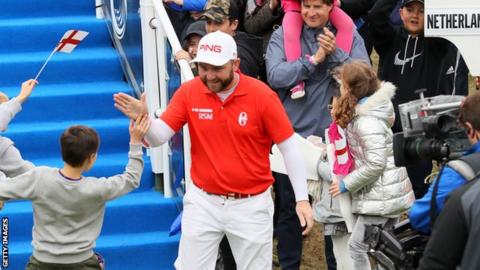
Golf has gained “six-appeal” and taken a significant step towards finding a marketable short form of the game.
The European Tour’s Golf Sixes, staged at the Centurion Club near St Albans, proved popular with players and fans and established itself as the blueprint for the sport’s version of cricket’s Twenty20 format.
Introducing the use of a shot clock on one of the holes is an idea that could swiftly be incorporated in existing long-form tournaments.
But this inaugural event also proved meaningful golf matches can be played over as few as six holes. They can be done and dusted in little over an hour and a decent tournament can be completed in a weekend.
This is just what golf needs with the current perception that it is increasingly losing out because it takes too long to play and watch.
Traditional professional golf becomes genuinely absorbing “down the stretch.” Golf Sixes catapults us straight to that point with no preamble.
Every shot counts, making the importance of a good start paramount, but there remains the opportunity for dramatic fight-backs. This is a formula that serves so well cricket’s IPL and Big Bash matches.
For spectators, there was plenty to watch and hear. Some of the stuff pumped through the microphones and speakers missed the mark but an engaging atmosphere was generated.
To make it work better they should employ announcers who know their subject and are capable of identifying all of the players and match situations.
Celebrity TV coverage
Further gimmicks are not required, nor do we need our intelligence insulted when mediocre putts are described as “great”.
Likewise, the celebrity aspect of the television coverage grated somewhat and we did not need to be constantly told of the tournament’s success in such sycophantic terms.
We could see for ourselves that it was worth watching.
It could have been bettered if the players wore microphones – listening to tactical discussions would have enhanced the coverage and the greensomes matchplay alternate shot format was a good choice.
But the most significant development was the shot clock used on the fourth hole. “I think it’s a great idea,” said England’s Andy Sullivan.
During the first day of round-robin group matches, players were allowed 40 seconds to execute their strokes. That was reduced to 30 for the second day of knockout matches.
“What we found is when we’re hitting, we had such a long time,” Sullivan added. “You’ve got ages, and it’s embarrassing when you are playing on the Tour and it is taking that long.
“I think that’s highlighted a lot of things, really, for the Tour.”
Paul Peterson, of the United States, fell foul of the shot clock on the first day and it cost the Americans a quarter-final place. “He’s probably humiliated,” said Chris Wood, Sullivan’s England team-mate.
“I think that’s quite a lot to do with it, the naming and shaming. Sully is right, there’s too much leniency I think.
“Players are to blame; hold your hands up there, but referees can be stronger on occasion.”
Slow play is the enemy
European Tour chief executive Keith Pelley has identified slow play as golf’s biggest enemy. It would be a surprise if he is not considering proposing wider use of shot clocks.
He will also be wondering where next to take the Golf Sixes concept.
“I think it is definitely answering the cry from the global world of golf to be innovative and not be afraid of change,” Pelley told BBC Sport.
“There needs to be another way to attract the younger generation. Is this the answer? Maybe, and we will take what is good out of this and build on it.”
The Tour will examine player feedback – some felt the knockout matches should have lasted nine holes – and marketing data before deciding their next move.
“It will definitely be back next year,” Pelley announced at the closing ceremony.
Certainly it feels as though his Tour has arrived on a concept that can complement the existing diet of predominantly 72 holes strokeplay.
It would work well under floodlights in big city venues where it is easier to attract big crowds. They are vital to generating an atmosphere commensurate with the excitement of the golf.
The inaugural tournament ended with Denmark winning the final against Australia on the closing green. Scotland came third, triumphing by inches in a nearest the pin shootout against England’s quarter-final conquerors, Italy.
It was a fitting climax to a weekend that lays down a very encouraging and exciting marker for the future development of the game.



